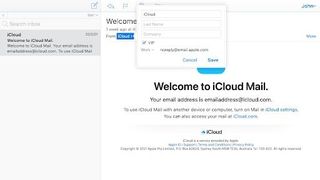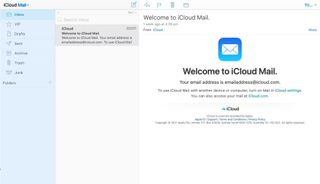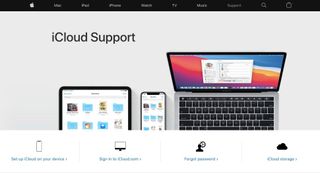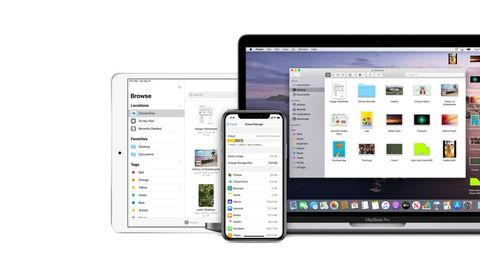IT Pro Verdict
Pros
- +
Free plan
- +
Good spam filtering
- +
Good app integration
Cons
- -
No custom domains
- -
No POP3 support
- -
Setup difficult for non-Apple devices
If you own an Apple device, you probably already know about iCloud, the online cloud storage service provided by Apple. But you may not know that it is also an email service, and that you can use it without having to own an Apple device. In fact, iCloud Mail in many ways rivals the most well-known and best email providers.
In this iCloud review, we take a closer look at iCloud Mail, including its plans and pricing, feature, interface, support, and security.
iCloud: Plans and pricing
Anyone who purchases an Apple device automatically gets a free iCloud account with 5GB of storage. But you don’t have to purchase a device to be able to take advantage. You can sign up for an account and use iCloud Mail on a non-Apple device as well.
A storage limit of 5GB might seem reasonable if you’re not a heavy email user, but the thing to remember is that the included storage is for everything connected to iCloud, not just email. So if you also use iCloud for backing up photos, videos, and music, then 5GB won’t go very far.
But Apple also provides three paid plans with different amounts of storage. For 79p month, you can get 50GB of storage; £2.49 a month will get you 200GB; and £6.99 a month a whopping 2TB!
Features
Aside from offering storage at decent prices, iCloud also offers several other great features.
Apple device owners will love how easy it is to connect and have their email synced across their devices, with push notifications so you’ll always be alerted when new messages arrive.
iCloud Mail can also be used with Microsoft Outlook on Windows computers, but you’ll need to install the iCloud for Windows app, and the set-up may not be as straightforward. Some people have issues with duplicate contacts and calendars, or their version of Outlook may not be supported.
iCloud’s spam filter does a good job of detecting spam and making sure it doesn’t hit your inbox. No spam filter is 100% accurate, however, so if some unwanted messages do slip through, you can mark them as spam and help train the app to remove similar messages in the future.
Much like labels in Gmail, folders in iCloud let you organize your mail the way you like. There is also the ability to create filters to sort messages based on simple criteria, and you can search for mail by sender, recipient, or subject.
This feature allows you to also create easily-accessible folders for your favorite senders by clicking on the sender’s name in the message header, and selecting VIP. A folder for this sender will then appear in the sidebar of iCloud for easy access.

Interface and in use
To get started, you’ll need an Apple ID. If you’re setting up an Apple ID for the first time, and you choose to create an iCloud email address as part of the setup, an iCloud email account will be created along with your new Apple ID.
If you already have an Apple ID and want to add an iCloud email address, you can do that on a Mac computer from internet accounts by ticking the box next to the Mail app after selecting the iCloud tab. On an iOS device, go to Settings, iCloud, and then Mail. The last step for both is to choose the name you want to go before @icloud.com.
You can then send and receive emails from the Mail app on your Mac, iPhone, or iPad - or you can choose the web interface. This is very similar to both Mac and iOS apps, although closer to what you see on an iPad. The web interface will run on any device that has a web browser, making it truly cross-platform.

Support
iCloud has its own dedicated support page on the Apple website, which contains links to various help articles; a page to check the iCloud system status; and the Apple support community forums, where you can ask questions for other Apple users to answer.
If you have a problem that you need more direct help with, there is the Get Support section, which works in the same way as it does for any other Apple product or service. After choosing from a series of topics, you’ll eventually end up on a page where you can provide your phone number, and someone from Apple will call you back.

Security
iCloud provides several industry-standard security features, such as two-factor authentication (2FA), security tokens, and TLS 1.2 encryption. Two-factor authentication makes your devices more secure by requiring both a password and a six-digit verification code to access your accounts.
Native Apple mobile apps like Mail, Contact, and Calendar use security tokens for authentication, which means the devices themselves don’t need to store your iCloud password.
The encryption for iCloud Mail only covers the traffic between your device and the server: the data stored in its IMAP servers isn’t encrypted. This approach to IMAP encryption is what most IMAP providers offer. It’s not fully HIPAA compliant, but it’s unlikely you’d need to comply with HIPAA except for business purposes, and you probably wouldn’t be using icloud.com addresses for your business anyway.
The competition
Apple is just one of the tech giants that has ventured into providing email services. Others include Google, with Gmail/Workspaces, and Microsoft with Outlook/Microsoft 365. All offer email, online storage and backup services, together with access to a variety of other apps for contacts, calendars, and more.
Gmail and Outlook are the free versions, and both offer 15GB of mailbox storage. In Google’s case, that 15GB is shared across Google Drive and Photos, whereas Microsoft offers an additional 5GB storage for OneDrive other than email. Both also offer paid personal and business plans.
Microsoft’s paid plans are under Microsoft 365: personal plans range from £59.99 to £79.99 a year and Business plans from £4.50 to £16.60 a month. Both offer mailbox storage of 50GB and OneDrive storage of 1TB.
Paid Google personal accounts are under Google One, and range from £15.99 to £79.99 a year for 100GB to 7TB of storage. Business accounts are under Google Workspace, and range from £4.14 to £13.80 a month for 30GB to 5TB of storage.
Probably the main reason you’d need to consider Google or Microsoft over Apple for email is that Apple doesn’t offer custom domains, i.e. yourname@yourbusiness.com, whereas the others do. With iCloud, your email address has to end in icloud.com, which makes it less than ideal for business users.
Final verdict
iCloud Mail is easy to use, reasonably priced with good storage limits, and has a useful web interface, which means it can be used on any device. It also has decent spam filtering and tight integration with Apple products.
But while it shares many features with the other big email service providers, its lack of an ability to use custom domains to match your business branding means it can’t really be considered a a viable option for business email.
- Read our iCloud Drive review.
John is a freelance writer and web developer who has been working digitally for over 30 years. His experience is in journalism, print design and web development and he has worked in Australia and the UK. His work has been published in Future publications like TechRadar, Tom's Guide, and ITProPortal.


